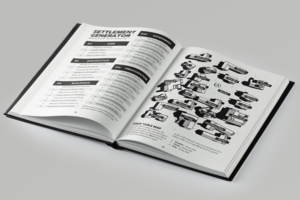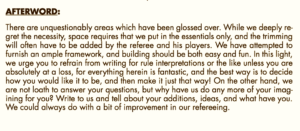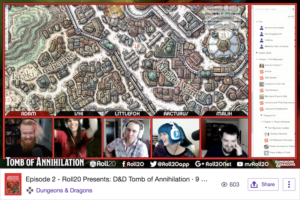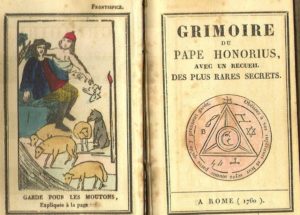At the end of the final OD&D booklet, The Underworld and Wilderness Adventures, Gygax and Arneson wrote: … why have us do any more of your imagining for you? There are several reasonable objections to that sentiment. When I want bread, I usually buy it from a baker rather than baking my own. There is nothing wrong with outsourcing, even within a creative hobby like playing old school D&D. While acknowledging the value and legitimacy of dividing labor, there is still something special about doing your own imagining for roleplaying games, which are particularly easy to customize, especially compared to other forms of art and entertainment.
This may be obvious conceptually, but gamers, even within our DIY-obsessed corner of the hobby, often behave in ways that belie an attitude valuing imagining things yourself. People, myself included, buy and read innumerable, often trivially different, takes on core rules, spell systems, adventure modules, and so forth. People also create, share, and hack, of course, but sometimes I still wonder about the balance between these activities. Why so much consumption and passive behavior, compared to play? The play is, after all, the thing. While some amount of learning and consumption may be required for play, the claim that people buy and read more than needed to play seems obvious and uncontroversial.

Black Hack v2 (this might be a mockup)—Kickstarter
This general tendency is one reason why I have been impressed by the community that has developed around the Black Hack, which is currently soliciting funds for a second edition. I can take or leave many ofBlack Hack’s specific rules, despite having similar design priorities. I value concision, ease of use, quick character generation, lethality, modularity, limited bookkeeping, and so forth. So does the Black Hack. However, I also already have systems that I like which solve most of these problems, so why bother with yet another system? For me, the Black Hack is like reading someone else’s collection of battle-tested house rules, maybe a few of which I might experiment with and adapt.
But that is exactly the point: the Black Hack has some useful mechanical ideas, for sure, but it also emphasizes, through its style, through its attitude, through its confidence, that designing these games and playing these games lie on the same plane. No pedigree, training, or extensive experience is required, once you have the basic idea. Traditional fantasy games, those in the DIY D&D or OSR traditions, are robust. There is minimal danger of breaking the game if you accidentally award too much XP, try out a new rule for shields, or replace spell memorization with magic points. Most of those dragons were unbalanced encounters anyways, so as long as you have good communication within your group, making sure that everyone is on the same page about game expectations and shared fictional reality, the rules only need to remain within very broad parameters perform their duty. And further, some adjustment will almost certainly make any rule set work better for your own group.
Is it hypocritical to plug yet another system, crowd funding for a second edition no less, in a post about doing your own imagining? Perhaps. Being a book snob, I am glad the second edition will be printed using offset printing rather than printed on demand1. Stitched bindings is a stretch goal, unlocked at 1200 backers, which is unreached at the time of this writing. So, back the project if you want to help create nicely bound books, or if you want more house rules to read, or if you want some more random generators. From my point of view, however, the most valuable return on the continued success of the Black Hack is an influential rule set and brand carrying the torch of making the game your own rather than following others and deferring to established creators.
1. “We’ve vowed never to do POD because of the quality issues, and our final stretch goal is to get stitch binding on both books – I think the regular hardback has a high enough print run to make stitch binding affordable at the moment, with the stretch goal to get the collector’s book stitch binding. We’re doing everything we can to get them as high quality production finish as possible!” (David Black, direct message.) ↩




